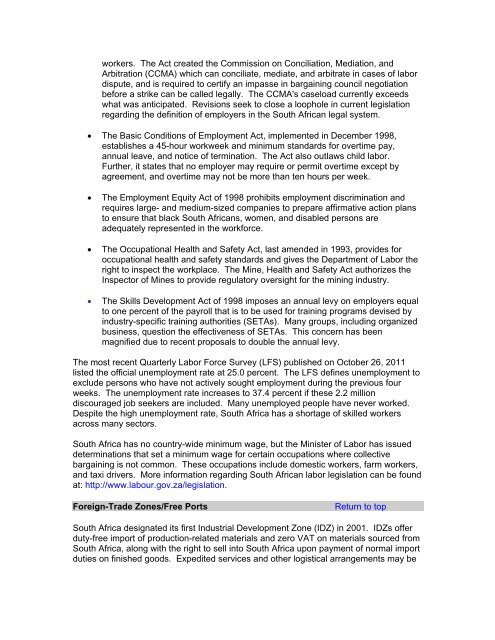South Africa - International Franchise Association
South Africa - International Franchise Association
South Africa - International Franchise Association
Create successful ePaper yourself
Turn your PDF publications into a flip-book with our unique Google optimized e-Paper software.
workers. The Act created the Commission on Conciliation, Mediation, and<br />
Arbitration (CCMA) which can conciliate, mediate, and arbitrate in cases of labor<br />
dispute, and is required to certify an impasse in bargaining council negotiation<br />
before a strike can be called legally. The CCMA's caseload currently exceeds<br />
what was anticipated. Revisions seek to close a loophole in current legislation<br />
regarding the definition of employers in the <strong>South</strong> <strong>Africa</strong>n legal system.<br />
• The Basic Conditions of Employment Act, implemented in December 1998,<br />
establishes a 45-hour workweek and minimum standards for overtime pay,<br />
annual leave, and notice of termination. The Act also outlaws child labor.<br />
Further, it states that no employer may require or permit overtime except by<br />
agreement, and overtime may not be more than ten hours per week.<br />
• The Employment Equity Act of 1998 prohibits employment discrimination and<br />
requires large- and medium-sized companies to prepare affirmative action plans<br />
to ensure that black <strong>South</strong> <strong>Africa</strong>ns, women, and disabled persons are<br />
adequately represented in the workforce.<br />
• The Occupational Health and Safety Act, last amended in 1993, provides for<br />
occupational health and safety standards and gives the Department of Labor the<br />
right to inspect the workplace. The Mine, Health and Safety Act authorizes the<br />
Inspector of Mines to provide regulatory oversight for the mining industry.<br />
• The Skills Development Act of 1998 imposes an annual levy on employers equal<br />
to one percent of the payroll that is to be used for training programs devised by<br />
industry-specific training authorities (SETAs). Many groups, including organized<br />
business, question the effectiveness of SETAs. This concern has been<br />
magnified due to recent proposals to double the annual levy.<br />
The most recent Quarterly Labor Force Survey (LFS) published on October 26, 2011<br />
listed the official unemployment rate at 25.0 percent. The LFS defines unemployment to<br />
exclude persons who have not actively sought employment during the previous four<br />
weeks. The unemployment rate increases to 37.4 percent if these 2.2 million<br />
discouraged job seekers are included. Many unemployed people have never worked.<br />
Despite the high unemployment rate, <strong>South</strong> <strong>Africa</strong> has a shortage of skilled workers<br />
across many sectors.<br />
<strong>South</strong> <strong>Africa</strong> has no country-wide minimum wage, but the Minister of Labor has issued<br />
determinations that set a minimum wage for certain occupations where collective<br />
bargaining is not common. These occupations include domestic workers, farm workers,<br />
and taxi drivers. More information regarding <strong>South</strong> <strong>Africa</strong>n labor legislation can be found<br />
at: http://www.labour.gov.za/legislation.<br />
Foreign-Trade Zones/Free Ports Return to top<br />
<strong>South</strong> <strong>Africa</strong> designated its first Industrial Development Zone (IDZ) in 2001. IDZs offer<br />
duty-free import of production-related materials and zero VAT on materials sourced from<br />
<strong>South</strong> <strong>Africa</strong>, along with the right to sell into <strong>South</strong> <strong>Africa</strong> upon payment of normal import<br />
duties on finished goods. Expedited services and other logistical arrangements may be
















